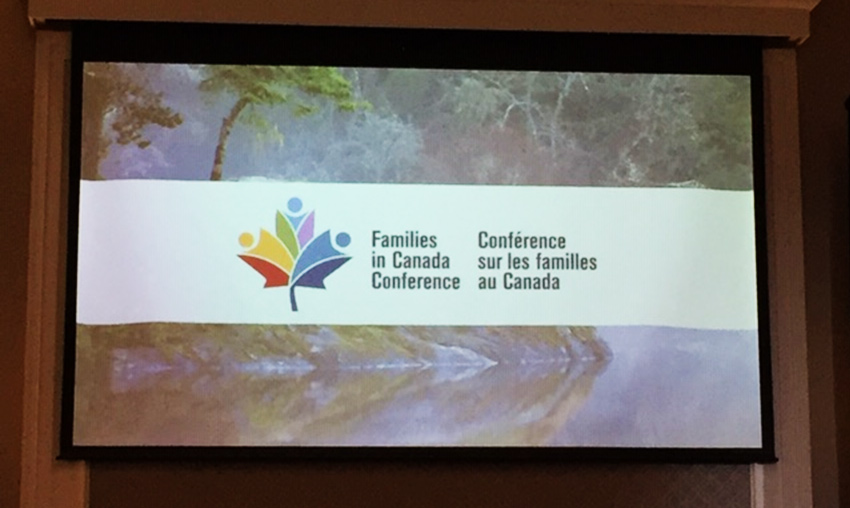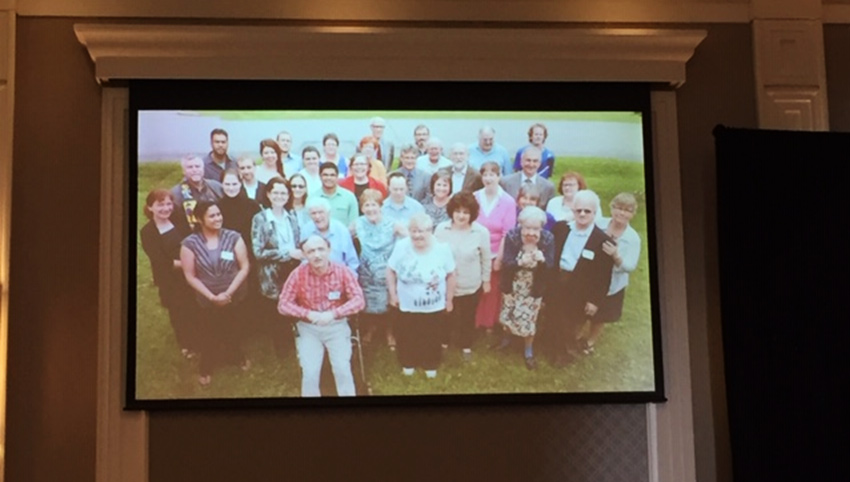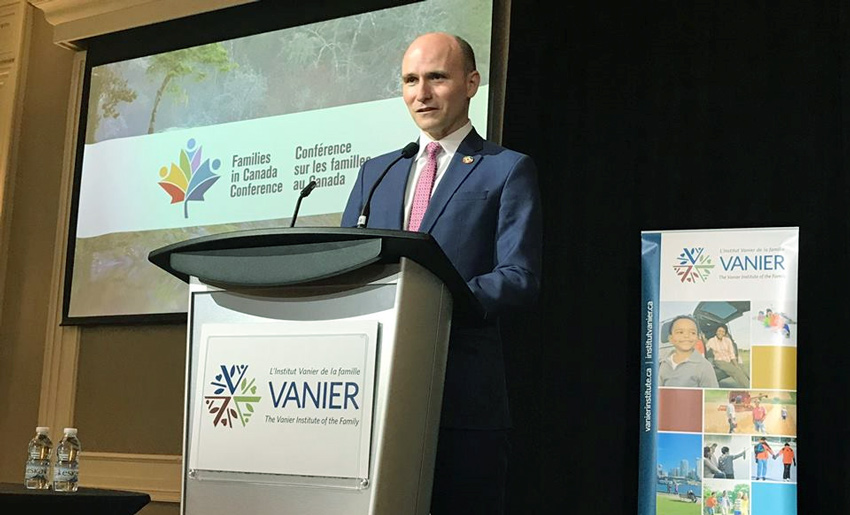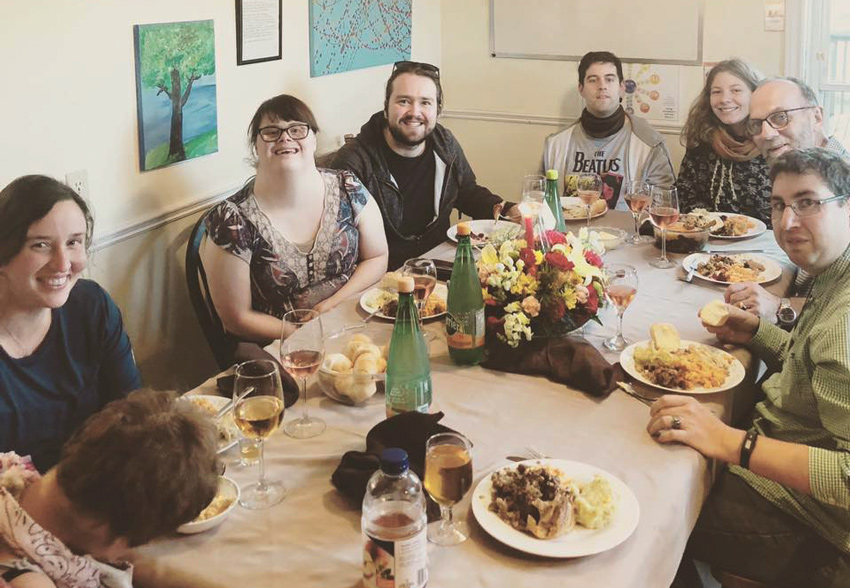Blog
The important work of the Vanier Institute of the Family is a call to L’Arche

By John Guido
On March 27 and 28, 2019, five of us from L’Arche attended the Vanier Institute of the Family “Families in Canada” conference. At first, I wasn’t sure why we were there. The conference theme was “THINK BIG: How can we use “Big Data” to inform and inspire big ideas to optimize family well-being in Canada?” I was fully on board with L’Arche developing our capacity for the better use of data (both numbers and stories) as we seek to increase our impact in Canadian society. We’ll write more about that another time.
My question was about how L’Arche might play a role in optimizing “family well-being.” While families have always been part of the life of our communities and our biggest supporters, we rarely identify them as a ‘primary beneficiary’ except when we provide supports to their family member. Today, L’Arche’s relationship with families is changing as we support more persons with disabilities living with their families and welcome them and their family members into our community life. However, the question remains: Should we focus more on the wellbeing of families, listening to and reflecting with them?
Is L’Arche a new kind of family?
My questioning went another direction as the conference focused on the outcomes of the Families in Canada Listening Tour. A photo was projected, and I was delighted to see some of my friends from L’Arche Ottawa in their community centre. On the Vanier Institute’s website, they summarize what they shared about the photo:

“In June 2014, the Vanier Institute of the Family launched the national Families in Canada Listening Tour at L’Arche Ottawa, a cousin organization founded by Jean Vanier – son of Vanier Institute founders General The Right Honourable Georges P. Vanier and Madame Pauline Vanier. Attended by Her Excellency Sharon Johnston, it was a special milestone for L’Arche and the Vanier Institute, both celebrating 50 years of service. Members of L’Arche discussed their experiences in their families of origin as well as those they have created at L’Arche, a home for people with intellectual disabilities. L’Arche provides an opportunity for these adults to live independently and participate in daily life activities together in a familial setting. The event was informative, insightful and inspirational, foreshadowing the success of the Listening Tour.”
The Vanier Institute’s understanding is that those of us in L’Arche belong both to families of origin and to our L’Arche families. “Our definition of family is deliberately broad to ensure that it captures all families and family experiences. It is a functional definition of family that focuses on relationships and roles – what families do, not what they look like.”

Minister Duclos
In his opening remarks to the conference, the Honourable Jean-Yves Duclos, Minister of Families, Children, and Social Development captured the core of what families do, “The Vanier Institute’s 2015–2016 listening tour asked people to complete the phrase “Family is…” and the answers were overwhelmingly:
- Family is Love;
- Family is Care; and
- Family is Support.
The Government of Canada is committed to ensuring people can love without labels, get care when needed and support one another at home, at work and in their communities.”
Some people might say that love, mutual care and support are what L’Arche does. Many people welcomed by L’Arche especially in the early years suffered the rejection of institutionalization or breakage with their family of origin for other reasons. They often say, “L’Arche is my family.” For these men and women, this may be their reality – L’Arche is the first or only family that they have known.

A special meal in L’Arche Saint John
As we move away from that painful era, the number of people in L’Arche without strong ties to their families of origin is decreasing significantly. Yet for many of us, there remains a strong identification with L’Arche as a “second family.” We have ties that bind us deeply to other members, an experience of belonging to each other. We often act like an extended family during daily meals, at the bedside in hospital, and in life celebrations such as birthdays, weddings, and funerals.
The problems of identifying L’Arche as a family
Despite these deep experiences of L’Arche as a family, there are problems with this identity. These are some of the issues that I’ve seen in three decades of lived experience:
- When we idealize family life, we will be disappointed on a regular basis because there is no place where people love perfectly.
- The family system gives primary power to the roles of father and mother which can be problematic if we replicate them unaware of the potential for abuse of power, or if we paper over experiences of poor boundaries, disrespect, harassment, and abuse.
- This concept may depend on persons with disabilities to be the children, especially if they have higher or increasing needs for support that make them more dependent.
- A family system often puts individuals into narrow roles and doesn’t always give them the room and support to take risks to explore, experiment, and break free.
- We can be too comfortable in our own home, too closed in ourselves, and afraid to be involved in the messy life of the wider community where people have different ways of seeing and doing things that might challenge us.
- L’Arche communities have dual identities of the community (that we may experience like a family) and the agency, the not for profit service provider funded and regulated by governments and accountable to a variety of stakeholders.
- This dual identity impacts us in many ways: turnover of assistants with a constant cycle of welcoming-forming-sending-grieving; lack of time and energy for assistants to ‘just be with’ their housemates and to focus on their own growth; inconsistent commitment to retired assistants, etc.
Like a family, L’Arche will never be perfect, but we must never use that as an excuse to tolerate behaviour that is controlling, conforming, closed in, or causes harm to vulnerable members. L’Arche is called to be a community where we develop strong bonds with safety, respect, and openness to growth, change, and the world around us.
From questions to a Call to Action
It’s clear that L’Arche isn’t a family – although it may substitute for family for people in need. And there are dangers in conceiving of L’Arche as a family without reflecting on what that implies and creating safe boundaries. Yet there is something about belonging in a community where I’m known and loved, where I’m deeply committed to the growth of others and they to me, which is like a family, either the family we know or the family we’ve been searching for.
Reconnecting to the Vanier Institute of the Family at Families in Canada 2019 is important for L’Arche in Canada. L’Arche has a profound lived experience walking with persons with intellectual disabilities and often with their families for 50 years. We need to explore where we’re being called to learn with and contribute more to the wellbeing of these families.
There is also a call to explore more deeply – with the Vanier Institute of the family and other partners in building vibrant communities – the ways in which communities are like and not like families; how we need both family and community to thrive; and how these primary spaces of belonging can support and challenge each other. L’Arche has a lot to learn yet much to offer as we build a society where each person, each family, and each community is healthy, valued, and contributing their gifts and abilities for the good of all.
Make a Donation Now
Themes
- Accessibility
- Advocacy
- Aging
- Amitié
- Apprentissage
- Artist
- Belonging
- Care
- Caring for Others
- Celebration
- Collaboration
- Communication
- Community
- Contributions
- Core Members
- Creativity
- Daily Life
- Day Center
- Day Program
- Disability Arts
- Diversity
- Gifts and Abilities
- Gratitude
- History
- Inclusion
- Institutions
- Intentional Community
- Leadership
- Legislation
- Life-sharing
- Listening
- Mission
- More Human Society
- Mutual Relationships
- Neighbourhood
- Outreach
- Partnership
- Personal Journey
- Persons with Disabilities
- Policy
- Project
- Respect
- Responsibility
- Rights
- Service to Others
- Society
- Solidarity
- Story
- Teamwork
- Togetherness
- Traditions
- Values
- Vision
- Well-Being
- Workshop
- World
